Writing Effective Sentences1
Effective Writing

1.1 Stylistic Fra bibliotekeaning (文体意义)
1. Penalties for overdue books will be strictly enforced. (written) You have got to pay fines for overdue books. (spoken)
Effective Writing
Essentials & Techniques
1. Diction 2. Effective sentences 3. Developing a paragraph 4. Developing a composition
1. Diction
Diction is the choice of and use of words. In learning to write, sometimes we may use the wrong words, but more often the words we uses are not entirely wrong, but inappropriate, inexact, unidiomatic or uninteresting. A basic knowledge of diction is helpful.
2. They approved of the plan… (formal) They agreed to the plan… (informal)
1.1 Stylistic meaning (文体意义)
answer/respond unlike/dissimilar handy/manual homely/domestic leave/depart bodily/corporal brotherly/fraternal
英语写作基础教程(effective Sentences 1)

Do not use different forms to express parallel ideas. E.g. Do not make unnecessary shifts in person and number, and the voice, tense or mood of verbs. E.g.
(Unity does not mean a writer can write only simple sentences.)
A long sentence expresses ideas that are closely connected. They are either ① A central idea supported or modified by various subordinate ideas, or ② Two or more related parallel ideas. e.g. The explorer who has just returned from the Antarctic is busy
Go on to p13 (after break)
Textbook: Instructor:
Class:
Size:
Classroom: Time:
Effective Sentences
Aim: Qualities of an effective sentence and ways to achieve effectiveness. Correctness alone cannot make a good sentence because it may not express the idea it intends to express very clearly or forcefully. It has to be effective at the same time.
Using effective sentences or sentence patterns

2. Using effective sentences or sentence patterns:(1) Use specific words(用具体词汇)106 —107 Examples:The test was difficult.——The maths final was filled with tricky, baffling problems.The boy was tired.——Little Robbie was so exhausted that he could scarcely keep his eyes open.I swept aside the things on my desk in order to spread out the road map. ——I swept aside the papers, books and magazines on my desk…(2) Use active verbs(用主动语态)(3) Use concise words(用词简洁)112Examples:In conclusion, I would like to end my essay by summarizing each of the major points that were covered within my paper.——I will conclude by summarizing my major points.Because of the bad weather, the school district felt it would be safer to cancel classes and let everyone stay home than risk people having accidents on the way to school.——The school district canceled classes because of the bad weather.Out of all the regrets in my life so far, one of my greatestones to the present time is that I did not take additional art classes when I was still in high school and had a chance to do so.——I regret not having taken additional art classes in high school.(4) Vary your sentences.(句型变化)1) Use coordinating word: and, but, for, or, nor, so, yet并列句2) Use subordinating word: if, even if, when, while….主从复合句3) Give a special opening word or phrase:-ed-ing-lyto word groupprepositional phraseExamples:Example 1:Concerned about his son’s fever, Paul called a doctor. Example 2:Humming softly, the woman browsed through the rack of dressesExample 3:Hesitantly, Sue approached the instructor’s desk.Example 4:To protect her hair, Eva uses the lowest setting on her blow dryer.Example 5:During the exam, drops of water fell from the ceiling.Activity: (134Lena and Miles wanted a nice, quiet, and relaxing vacation, so they rented a small lakeside cabin. Their first day there was very peaceful, but the situation quickly changed when a large family moved into a nearby cabin. They played music at top volume and raced around in a speedboat with a loud whining engine. No longer very relaxed, Lena and Miles packed up their things, drove off, and returned to their quiet apartment.。
英语写作基础教程(effective_Sentences_1)
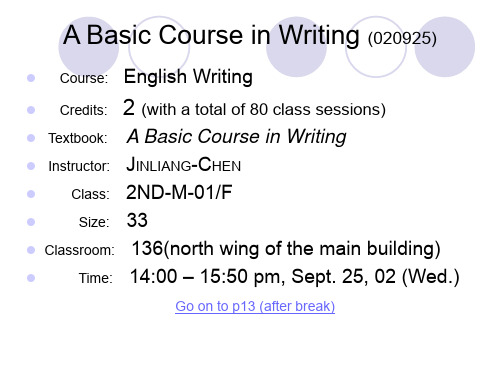
content is rather poor. (?3) Back
Do not make unnecessary or confusing shifts in person, number, tense, mood, and voice.
(Unity does not mean a writer can write only simple sentences.)
A long sentence expresses ideas that are closely connected. They are either
① A central idea supported or modified by various subordinate ideas, or
(The central idea: The explorer is writing reports on his adventures in the Antarctic.)
unity
Born in a small town in South China in the early 50s, he grew up to be a famous musician.
name on this sheet or paper. their names (person and number) He looks up difficult words in his dictionaries, and it
is very helpful. which is (person: wrong modifier/antecedent) She reviewed the lesson taught last week and all the
improving sentences

I. IMPROVING SENTENCES:A sentence is a group of meaningful words which expresses a sequence of complete thought. The sentence is the basic unit of writing. When you learn to write, you should learn how to write effective sentences first. Try to be alert to sentence-errors in order to write better sentences.In writing effective sentences, we often have two problems: one is meaning and the other is grammar. So we must improve our sentences both in meaning and in grammar.A. Improving Sentences in Meaning:In meaning we can improve sentences in three ways:1. One way is to substitute more exact words for the words with general meaning.For example: John and Jack ran.We can write: John and Jack were in a competition.or: John and Jack were in a race.These sentences suggest that they did not just run, but ran to see who was the best runner. They also suggest who was in the competition or race.Substituting means replacing one word with another. Y ou take out one word and you put in another word which is clearer and more precise.2. Another way to make a sentence better is to eliminate unnecessary words.Eliminating means taking the unnecessary words away and not putting anything back. When you write a sentence the first time you do not know some of words are not necessary in the sentence. When you reread your own writing, it suddenly seems that two or three words could say the same thing. It is enough to write it once. For example:I shall meet you at twelve o’clock noon.Twelve o‟clock is noon, so you do not have to write it in two ways one after the other. We can write:I shall meet you at noon.or: I shall meet at twelve o’clock.So you eliminate the unnecessary words.3. The third way of improving a sentence is by adding words.We add words only if more information is needed to make a sentence meaningful. For example:John and Jack had words.That is to say, …John and Jack had different opinion‟. So if you say, …John and Jack argued‟, you have chosen a more exact word. If you say, …John and Jack argued because they did not agree with the arrangement‟, that tells the reader not only they had different opinions, but why they had different opinions. Clearly, this means writing a much longer sentence.Similarly, we may write:Suzy has a garden.or: My elder sister, Suzy, has a garden.or: Suzy has had a garden to work at.And we may have some other ways to improve a sentence in meaning. Here, we just learn some of them.B. Improving Sentences in GrammarIn grammar we can also improve sentences in three ways:1. One way of improving sentence-grammar is by correcting the ungrammatical words.Two of my sister‟s classmates cannot decide which profession to follow –teachers, dentists, and lawyers.In this sentence teachers, dentists, and lawyers are people, not professions. So we must substitute teaching, dentistry and law for teachers, dentists, and lawyers respectively.We can write:Two of my sister‟s classmates cannot decide which profession to follow –teaching, dentistry, or law.2. Another way to improve sentence-grammar is to eliminate repetition.For example:Where have you been at?Would you like to know with what kind of people I associate with?We should write:Where have you been?Would you like to know with what kind of people I associate?2. The third way to improve is by adding words.We add words because the omitted word or words are necessary grammatically. For example:I never have, and never will, understand the mechanism of a television set.“I never have understand” is ungrammatical. So we must supply the necessary word, and write:I never have understood, and never will understand the mechanism of a television set. Similarly, we cannot write:a.The blind boy needs someone to educate and care for him.b.My English mark is always as high or higher than my French mark.We should write:a.The blind boy needs someone to educate him and care for him.b.1) My English mark is always as high as my French mark, or higher.2) My English mark is always as high as or higher than my French mark.EXERCISES:I. Clear away the excess:1.Mrs. Floyd is a woman of about fifty years age.2. I am trying to find the career to which I am best suited for.3. V ary your sentences in the ways in which you have studied in class.4. The number of classrooms in the new high school will be double over that in the old building.5. The reason yellow sodium vapor lights are being used on expressways is because they are lessenergy than white fluorescent lights.II. Improve the following sentences by adding words or by substituting a more accurate word or words for the italicized one.1. Y our friend will phone you.2. Two children sat on the bench, crying.3. There are things we are going to have to deal with in this decade.4. Richard is a bad boy.5. We must find out what steps are yet to be done.III. Decide what the writer was trying to say in each of the following sentences. Then choose precise words and express the writer’s thought precisely:1. Dad is going to analyze his baseball game and try to improve his defect.2. My most serious problem is good handwriting.3. Any defect in our appliances, if reported to the main office, will be greatly appreciated.4. December 14 was a snowy, windy evening.5. Try Our Cakes. None Like Them (Sign in a bakery window).IV. Add the necessary word or words in each of the following sentences:1. Jane says she has not and will not learn to play volleyball.2. Samantha is as tall or taller than her mother.3. I have never seen or spoken to him.4. The speed of the new car is almost equal to the airplane.。
How to write an effective sentence

First person singular Effective for informal writing, especially for writing about your personal interests and experiences First person plural Slightly more formal than the first person singular. It is used to convey a sense that you and the readers are partners. It takes emphasis away from the writer as an individual and places it on what ever group is designated “we/us/our”. Second person singular or plural It should be used carefully and it make reader feel that the writer are speaking directly to them. So it is not recommended to the English writing beginners. Third person singular and plural More formal. They are used for much academic, technical, and scientific writing where tradition or the subject demands an air of distance and objectivity.
Sentences

Parts of a sentence:
Verb
A word the expresses action (run, carried,eat) or state of being (is, are, seemed) Subject
The subject is the part of the sentence about which something is said. The subj. is always a noun, or a word or phrase that functions as a noun, or a clause that functions like a noun.
Combining Sentences
Of course, you wouldn't express each idea separately, as above. Instead, you would combine the ideas into longer, more detailed sentences. Sentence combining, which can be done in a variety of ways, is one of the most effective writing techniques you can practice.
HW: Read Chapter 35
Do: exercages 345-371, don't do the exercies.
Combining Sentences
If you were to write a sentence about a tornado that struck a small town without warning, causing a great deal of damage, a number of serious injuries, and several deaths, you would really be working with six different ideas:
《英语写作》Effective Sentences

Part 1:Unity
• Original: Du Fu was one of the greatest poets.
(Incomplete idea)
• Revised : Du Fu was one of the greatest poets of the Tang dynasty of China.
人称、数、语态、时态或语气上混乱
Part 2:Coherence
Practice: Find out the faulty parts in the following sentences and try to revise them.
1. A man is judged not only by what he says but also by his deeds.
2. She told my sister that she was wrong. 3. She bought several picture books and put them into her
bag, which she intended to give to her children. 4. Looking out of the window, the grassland stretches as far
Q: What are the principles for effective sentences?
CONTENTS
01 Unity 02 Coherence 03 Emphasis 04 Conciseness 05 Variet 1:Unity
1. Unity 一致性、完整性 A unified sentence expresses a single complete thought. It does not contain ideas that are not closely related, nor does it express a thought that is not complete by itself.
writing skill

Mrs. Chalmers was kind of fat and her hair was pretty blond and her complexion was soft and pink and she always looked as though she had been in the beauty parlor all afternoon. She always said ―My, you’re getting to be a big boy‖ to Peter when she met him in the elevator, in a soft voice, as though she was just about to laugh. She must have said that fifty times by now. she has a good, strong smell of perfume on her all the time, too. Mr. Chalmers wore pince-nez glasses most of the time and he was getting bald and he worked late at his office a good many evenings of the week. When he met Peter in the elevator he would say, ―it’s getting colder,‖ or ― it’s getting warmer,‖ and that was all, so Peter had no opinion about him, except that he looked like the principal of a school.
英语写作 Effective_sentences

Correctness Unity
Clarity
Coherence
Emphasis
Variety
Correctness
Try to avoid : 1. Run-on sentences(不间断句子、逗 号谬误句子、串句) 2. Fragmentary sentences(破句、不完 整句子) 3. Faulty parallelism (错误平行结构) 4. Misplaced modifiers(错置修饰语) 5. Dangling modifiers(垂悬修饰语
Disconnected sentences
Born in a small town in South China in the early 50s, he grew up to be a famous musician. He was born in a small town in South China in the early 50s. In his childhood he liked to sing songs. Later he entered a conservatory(音乐学 院). In the 70s he became a famous musician.
Ann told her classmate Jane that she had won the first prize.
Ann told her classmate Jane, “ I have won the first prize.”
Ann told her classmate Jane, “ You have won the first prize.”
英语写作 Effectivesentences精品PPT课件

Choppy sentences
He found the kitchen window open. He put a ladder against the window. He climbed in. Finding the kitchen window open, he put a ladder against it and climbed in.
predicate The disagreement between the antecedent and the
reference pronoun The incorrect use of part of speech The wordiness The confusing shifts The vague reference
As the competition for college enrollment is extremely keen this year, the candidates spend days and nights preparing for the entrance examinations, neglecting their health. In view of this, the newspapers carry articles urging teachers and parents to take up this problem seriously.
My best friend at university was our English teacher. Her name was Wang Ping. She taught us English for two years. My best friend at university was our English teacher, Wang Ping, who taught us for two years.
making+effective+sentences
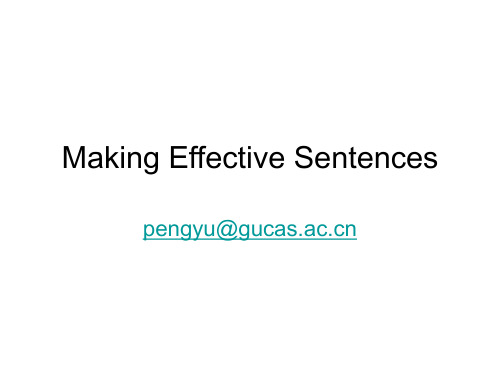
Task 1 Point out the fragments in the following sentences.
1. Then he attended Hillside Junior High. A school that was a bad experience. 2. Professor Wang lectured for half an hour without taking his eyes off his notes. Like Prof. Liu, he did not encourage students' questions. 3. For each category, a wide range of patterns to choose from. It was hardly possible to distinguish between them. 4. Some of these fellows would go into the restaurant for a steak dinner and a few glasses of beer. After this meal, they were ready to set out. 5. In the seventh grade every young boy goes out for football. To prove to himself and his parents that he is a man.
6. The jury (is, are) discussing the murder case at court. 7. Physics, which (is, are) his favorite subject, (is, are) taught by Mr. Tong. 8. Smoking cigarettes (is, are) dangerous to your health. 9. The changes in the city (was, were) so great that I could hardly find the house where I used to live. 10. The change in male attitudes (is, are) most obvious in education.
Effective Sentences(第一部分及作业)
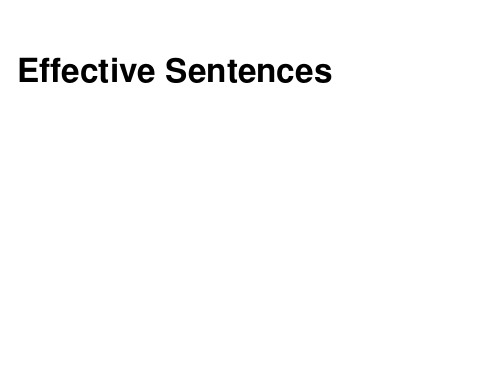
•Correct sentences alone can not necessarily make good writing. Effective Sentences and paragraphs need the following qualities:
• • • • •
• The ING form of the main verb or HAVING plus the Past Participle may both be used with verbs that convey the idea of completeness.
• Examples: Finishing my work, I went to a movie. • OR: • Having finished my work, I went to a movie.
Effectiveness and colorful style are attained by using various sentence openers, appositives, etc.
Clause Openers
a. Adverbial Clause Openers (subordinating conjunction) Normal order: 1.Evening approached and the sun sank below the horizon. 2.The instructor was delighted as he watched the student pilot make a perfect approach and a smooth landing. Adverbial Clause Openers: As evening approached, the sun sank below the horizon. As he watched the student pilot make a perfect approach andructor was delighted.
大学英语写作基础大纲

《英语写作》教学大纲第一部分大纲说明一、课程基本情况课程编码:08020012课程名称:英语写作课程类别:专业课程学时/学分:36/2先修课程:综合英语,英语听力等适用专业:三年制英语教育专业开课系(部)或教研室:外语系英语专业教研室二、课程的性质、内容和任务(一)课程性质本课程为三年制大专英语专业的专业必修课,是为英语专业学生开设的英语专业技能提高课程,是英语专业专科阶段一门重要的实践课程,它与英语专业的听、说、读等课程相辅相成、密不可分。
本课程旨在扩大英语专业学生的知识领域,巩固和提高学生的语言技能,重点培养学生驾驭英语语言文学知识和对文学作品的独立欣赏的能力,从而使其能得体而流畅地使用语言, 写出语言通顺、思路清晰、内容充实、具有一定广度与深度的英语文章,培养学生利用图书馆和计算机网络查阅资料和独立分析问题的能力,把用英语表达思想的能力提高到一个新的高度。
(二)课程内容课程的主要内容从单词、句型到段落,有步骤、有层次地训练,最终使学生能够写出内容切题、条理清楚、语言正确的英语短文,并让学生书写应用文,即书信、便条等,熟悉应用文的格式和行文,并能正确书写相应的应用作文。
(三)课程任务通过该课程大量的范例研究和写作实践,培养学生用英语的基本写作能力,特别是篇章结构和句子层面的基本功,为制作对外宣传的实用文提供模仿的范例,帮助学生掌握各种写作技巧,解决在实际阅读各种实用文时遇到的各种困难,掌握地道的英语,,从而提高书面交际能力。
课堂教学以讲解教材为主,包括当场写作练习和作文讲评,课外教学通过布置作业以加强理解和训练。
该课程可加强学生对英语阅读、综合英语等其他英语课程中文章结构、句型结构、篇章类型的把握和认识,促进各科目的融会贯通。
三、教学的目的和要求《英语写作》在知识习得上注重培养学生对英文写作的热情和创造性,在原有的语言知识基础上,不断提高思想表达的准确性与鲜明性,逐渐让他们感受到英语的极强表达力;在能力素质上,重视锻炼学生的书面语言运用能力,促进学生英语运用综合素质的发展,从而提高学生的逻辑思维能力和篇章衔接贯通运用能力。
英文作文好句高三
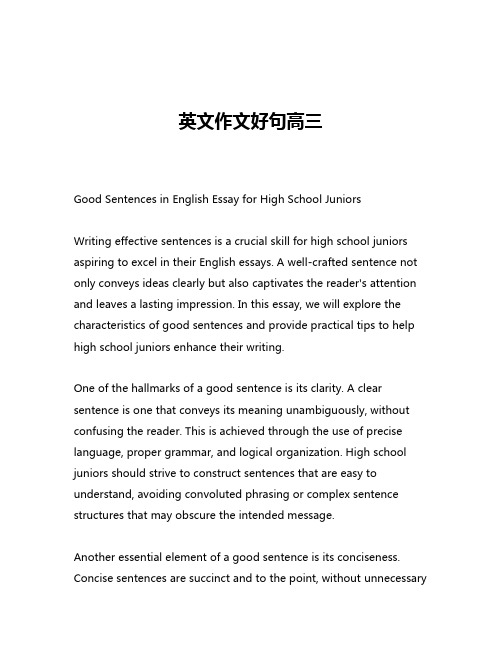
英文作文好句高三Good Sentences in English Essay for High School JuniorsWriting effective sentences is a crucial skill for high school juniors aspiring to excel in their English essays. A well-crafted sentence not only conveys ideas clearly but also captivates the reader's attention and leaves a lasting impression. In this essay, we will explore the characteristics of good sentences and provide practical tips to help high school juniors enhance their writing.One of the hallmarks of a good sentence is its clarity. A clear sentence is one that conveys its meaning unambiguously, without confusing the reader. This is achieved through the use of precise language, proper grammar, and logical organization. High school juniors should strive to construct sentences that are easy to understand, avoiding convoluted phrasing or complex sentence structures that may obscure the intended message.Another essential element of a good sentence is its conciseness. Concise sentences are succinct and to the point, without unnecessaryfiller words or redundant information. High school juniors should learn to identify and eliminate extraneous details, streamlining their sentences to focus on the core message. By doing so, they can create a more impactful and engaging writing style.Variability in sentence structure is also a key characteristic of good sentences. High school juniors should aim to incorporate a diverse range of sentence types, such as simple, compound, complex, and compound-complex sentences, to add rhythm and rhythm to their writing. This variety not only prevents monotony but also helps to emphasize important points and create a more dynamic reading experience.The use of vivid language is another hallmark of good sentences. High school juniors should strive to employ descriptive words, figurative language, and sensory details to paint a vivid picture in the reader's mind. By incorporating such elements, they can create sentences that are more memorable and impactful, leaving a lasting impression on the reader.In addition to these fundamental characteristics, good sentences often exhibit a sense of rhythm and flow. High school juniors should pay attention to the cadence and rhythm of their sentences, ensuring that they have a natural, melodic quality that enhances the reading experience. This can be achieved through the strategic placement ofpauses, the use of varied sentence lengths, and the incorporation of rhetorical devices such as parallel structure or repetition.Another important aspect of good sentences is their ability to convey emotion and personality. High school juniors should strive to infuse their writing with a unique voice and tone, using sentence structure and language to express their feelings, opinions, and personality. This can help to engage the reader and make the writing more relatable and compelling.Finally, good sentences often possess a sense of purpose and direction. High school juniors should ensure that each sentence in their essay contributes to the overall argument or narrative, moving the reader forward and guiding them towards a clear conclusion. By maintaining a focused and purposeful approach to sentence construction, they can create a cohesive and compelling essay that leaves a lasting impression on the reader.In conclusion, the ability to craft good sentences is a essential skill for high school juniors aspiring to excel in their English essays. By focusing on clarity, conciseness, structural variety, vivid language, rhythm and flow, emotional expression, and purposeful direction, high school juniors can develop a writing style that is both engaging and effective. Through consistent practice and a commitment to improving their sentence-level skills, high school juniors can elevatetheir writing and achieve greater success in their academic and professional pursuits.。
英语作文讨论学校万能句子
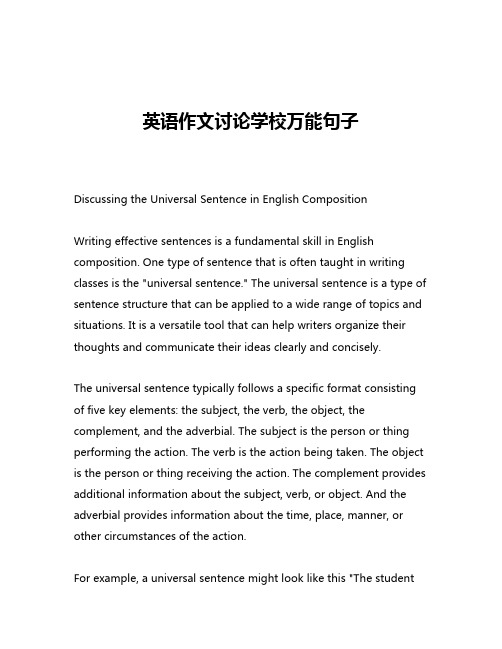
英语作文讨论学校万能句子Discussing the Universal Sentence in English CompositionWriting effective sentences is a fundamental skill in English composition. One type of sentence that is often taught in writing classes is the "universal sentence." The universal sentence is a type of sentence structure that can be applied to a wide range of topics and situations. It is a versatile tool that can help writers organize their thoughts and communicate their ideas clearly and concisely.The universal sentence typically follows a specific format consisting of five key elements: the subject, the verb, the object, the complement, and the adverbial. The subject is the person or thing performing the action. The verb is the action being taken. The object is the person or thing receiving the action. The complement provides additional information about the subject, verb, or object. And the adverbial provides information about the time, place, manner, or other circumstances of the action.For example, a universal sentence might look like this "The student(subject) completed (verb) the assignment (object) quickly (adverbial) with great care (complement)." Each of the five elements is present, and the sentence can be easily adapted to a variety of topics and situations.One of the key benefits of the universal sentence is its versatility. Because it follows a consistent structure, the universal sentence can be used to discuss a wide range of subjects, from academic topics to personal experiences. This makes it a valuable tool for writers who need to communicate complex ideas in a clear and organized manner.Another advantage of the universal sentence is its clarity. By breaking down the sentence into its component parts, writers can ensure that each element is serving a specific purpose and contributing to the overall meaning of the sentence. This can help to reduce ambiguity and ensure that the reader understands the intended message.Additionally, the universal sentence can be a useful tool for writers who are struggling with sentence structure or who need to improve their writing skills. By practicing the universal sentence format, writers can develop a better understanding of how to construct effective sentences and how to use the various elements of a sentence to convey their ideas.Of course, the universal sentence is not the only type of sentence structure that writers can use in their compositions. There are many other sentence structures, such as the compound sentence, the complex sentence, and the compound-complex sentence, that can also be used to achieve different rhetorical effects.However, the universal sentence can be a valuable tool for writers who are looking to improve the clarity and organization of their writing. By mastering the universal sentence format, writers can develop a better understanding of how to structure their ideas and communicate them effectively to their readers.In conclusion, the universal sentence is a powerful tool in English composition. Its consistent structure and versatility make it a valuable resource for writers who need to communicate complex ideas clearly and effectively. By practicing the universal sentence format, writers can develop a better understanding of sentence structure and improve the overall quality of their writing.。
典型英语句子作文模板

典型英语句子作文模板英文回答:Introduction:Crafting well-structured English sentences is a fundamental skill in language proficiency. To effectively convey your thoughts and ideas, it is essential to adhereto grammatical rules and syntactic patterns. This comprehensive guide provides a detailed framework for constructing typical English sentences, offering various templates and examples to enhance your writing ability.Sentence Structure:English sentences generally follow a subject-verb-object (SVO) structure. The subject performs the action,the verb describes the action, and the object receives the action. However, variations occur based on sentence type, such as interrogative, imperative, or exclamatory sentences.Basic Sentence Template:Subject + Verb + Object: The boy kicks the ball.Subject + Verb + Complement: The man is handsome.Advanced Sentence Templates:Subject + Verb + Indirect Object + Direct Object: The teacher gives the students a book.Subject + Verb + Object + Adverbial Modifier: The car drives quickly down the road.Subject + Verb + Subject Complement: The child became a doctor.Sentence Elements:Subject: The person, place, or thing performing the action.Verb: The action or state of being.Object: The receiver of the action.Complement: Additional information about the subject or object.Modifier: Words or phrases that provide further details or descriptions.Sentence Types:Declarative: States a fact or opinion.Interrogative: Asks a question.Imperative: Expresses a command or request.Exclamatory: Expresses strong emotion.Example Sentences:Declarative: The cat is sleeping on the couch.Interrogative: Where is the book?Imperative: Please sit down.Exclamatory: Wow, that's amazing!Tips for Writing Effective Sentences:Use strong verbs that convey action or meaning.Vary sentence structure to avoid monotony.Provide clear and concise information.Proofread carefully to ensure grammar and punctuation accuracy.Conclusion:Mastering the art of English sentence construction is essential for clear and effective communication. By understanding the fundamental structures, sentence elements, and various types of sentences, you can elevate yourwriting skills and convey your thoughts precisely.中文回答:引言:构造结构良好的英语句子是提高语言能力的一项基本技能。
前景实用英语答案

前景实用英语答案【篇一:前景实用英语二unit6教案】>? unit 6 eco-friendly world? teaching materialforward english for practical purposes, book 2, unit 6? teaching aims:in this unit, students are supposed to? master the words and expressions often used to talk about eco-friendly world1. learn2. how to express hopes and desires;? understand the listening information about eco-friendly world;3. understand the main idea of text a, and master the useful sentence structuresand words and expressions;4. master phonetic skill: liaison;5. do some grammar practice– attributive clause;6. know about some writing strategies and learn how to write an outline and fillout a form.? teaching emphasis1. to master the key language points and grammatical structures in the text;2. to know how to write an outline and fill out a form.? teaching difficulties1. to understand the main idea of text a, master the key language points andgrammatical structures in the text.2. to use the expressions learnt to talk about lifelong learning freely.3. to express one’s hopes and desires.? teaching approachescommunicative approach and computer-assisted instruction ? teaching aidsa projectora multi-media computer system? teaching procedures and contents (8 periods)part a lead intask 1 1 study the pictures and discuss the questions below in small groups. use the words given below if necessary1what can we benefit from the equipment in the first picture?2 do you know what the house in the first picture is called? what is specialabout it?. 3 what are the advantages of u-shaped lamps in the third picture?task 2 listen to the short dialogues and fill in the blanks.task 3 listen to the recording, and complete the passage.task 4 discuss the following questions with your partner about your understandingof lifelong learning.1. .what are the advantages of u-shaped lamps in the third picture?2. how do you understand the sayi ng ―it’s never too old to learn‖?text agreening the world begins at homelanguage and cultural points in the textgreenv. to make greene.g. the company is making efforts to green its products.公司正竭尽全力使产品更环保。
前景实用英语1答案

前景实用英语1答案【篇一:前景实用英语1unit1教案】txt>this is the first unit of book one.unit 1lead-in and text a in the lead-in section, you will learn how to use some words and phrases description the university’s life and will do some practical exercises.(1 period)1. study the pictures and give a brief discuss the three questions about lead-in talk on description university’s life words and phrases so as to define them.2. words and phrases:a. students, classmates, sports friends.b. classroom, football field, library, listening, playing, looking for.c. very much so, not at all.d. on the right,on the left.e. lecture theater...f. jump,head,goalg. freshman,sophomore,junior,senior...3. have the students listen to dialogue 1 (2-3 times) and fill in the blanks with the missing words;4. ask one student to read aloud the talk, so students can check theircompleted answers; present more words and phrases aboutdescription university’s life, make sure students know how to use those added words and phrases, and organize the activity toaccomplish dialogue 2.5. after a brief explanation of the dialogue1-2, the teacher gives thestudents a few minutes to think about the questions in the task3.6. ask students to answer the questions about the task3.in the text a section (1-2 period)a. lets the students answer the text-related questions(in the exercises), helps them identify the main idea of eachparagraph.b. analyzes some language points while discussing the whole text with the students.language pointsimaginev. to form a picture in your mind of what somethingmight bee.g.she imagined singing her favorite song on a big stage.她想象着自己在一个巨大的舞台上唱自己最喜欢的歌曲。
- 1、下载文档前请自行甄别文档内容的完整性,平台不提供额外的编辑、内容补充、找答案等附加服务。
- 2、"仅部分预览"的文档,不可在线预览部分如存在完整性等问题,可反馈申请退款(可完整预览的文档不适用该条件!)。
- 3、如文档侵犯您的权益,请联系客服反馈,我们会尽快为您处理(人工客服工作时间:9:00-18:30)。
Writing Effective SentencesNaturally, sb. / sth. does not cause / lead to / result in… — but sb. / sth. surely helps if only by doing….当然,某一结果并不是由某人或某物带来的,但这肯定给某人带来好处/坏处,虽说仅仅是······应用:a. 当然,仅有乐观态度还不能确保你生活幸福,但它的确会给你带来好处,虽说仅仅是改变了你对生活的态度。
Naturally, optimism alone does not ensure you a happy life—but it surely helps if only by changing your attitude toward life.应用:b. 当然,一事无成的后果并不是漫不经心所致, 但它的确会给你带来坏处,虽说仅仅是对你的表现产生了一点点影响。
Naturally, carelessness does not lead to your failure in everything — but it surely has negative effects if only by leaving a bit of its mark on your behavior.Despite… / For all…, sb. did manage to do sth.. Even so, sb. else refuses to…, doing sth. else instead.尽管······,某人设法做了某事。
即使如此,他人仍拒绝······,而是······应用:a. 尽管薪金低,工作条件差,他还是圆满地完成了任务。
即使如此,老板也没有提拔他,而是不公正地对待他。
Despite the low salary and bad working conditions, he did manage to finish his task perfectly. Even so, the boss refuses to get him promoted, treating him unfairly instead.应用:b. 尽管困难重重,中国设法改善了人民生活条件,确保了人民的合法权益。
即使如此,一些西方国家打着人权的旗号,拒绝投我国人权现状的赞成票,而是横加指责。
For all various difficulties, China has managed to improve people’s living conditions and guarantee their legal rights. Even so, some western countries, under the cover of human rights, refuse to vote for the status of our civil rights, making unfounded charges instead.A recent (latest ) survey (study / investigation / poll) (conducted / done / taken by…) shows (reveals / indicates / finds) that sb. thinks…, while sb. else believes…最新调查表明:某人认为······,而其他人则认为······应用:a. 最近对大学毕业生做的一次调查表明:为数不少的人认为高薪水非常重要,而大多数人则认为找一个有意义的工作,做些有趣的事更重要。
A latest survey conducted among college graduates shows that quite a few people think a high salary is of great importance, while most of them believe doing something worthwhile and enjoyable at work is more important.应用:b. 社会学家做的一项调查表明:多数年轻人认为他们信守传统观念,而另有一些人认为为了家庭和孩子牺牲个人的幸福不值得。
A poll conducted by sociologists indicates that most young people think they remain true to the traditional values, while some others regard it as of little worth to sacrifice personal happiness for the sake of the family and children.Sb.’s formula / recipe / prescription for (doing) sth. is sth. else / to do sth. else. 某人(做某事)的诀窍/ 秘诀是······应用:a.宽容、耐心和理解是她幸福婚姻的秘诀。
Tolerance, patience and understanding are her formula for a happymarriage.应用:b.他生意场上成功的秘诀是:诚信为本,顾客至上。
His recipe for success in business is to take honesty as his cardinal principle and put the customers first.Instead of doing sth., sb. tries to do sth. else某人不是要做某事,而是千方百计/设法做别的事情。
应用:a.一个有良知的记者不是要掩盖真相,而是千方百计使之大白于天下。
Instead of covering facts up, a journalist of conscience tries to bring them to light.应用:b.一个好母亲不是一味地迁就自己的孩子,而是设法让孩子明白是非曲直。
Instead of giving in to her child blindly, a good mother manages to make her child clear about right and wrong.As a replacement for sth./sb. lost, sb. (also) does sth. else. 作为对失去的某物/某人的弥补,某人(也)做别的事。
应用:a. 作为对自己的儿子在成长过程中缺乏父爱的弥补,他对自己的孙子倾注了全部的爱。
As a replacement for lack of father love during his son’s growth, he devoted all of his love to his grandson.应用:b.作为对民航业在全球性恐怖袭击中所受经济损失的弥补,一些国家对该行业提供了更多的优惠政策。
As a replacement for the economic loss of the civil aviation caused by the worldwide terrorist attacks, some countries provide more preferential policies for it.Typical patterns for comparisons and contrastsFor those who…, sth. is more…than sth. else.对那些······人来说,某事要比别的事更······应用:a.对那些从事管理工作的专业人士来说,与人共事的能力要比扎实的专业技术更重要。
For those professionals who are engaged in management, the ability to work with people is more important than the sound professional skill.应用:b.对那些追求家庭生活温馨的人来说,配偶的内在素质要比外表更可靠、更可取。
For those who go after the warmth of family life, the spouse’s interiors are more reliable and more desirable than his / her exteriors.While sb. watches his business/career/study etc. bloom/thrive/boom/prosper etc., sb. else is undergoing sth. unfortunate/distressing etc.在某人目睹其生意/事业/学业等兴旺发达的同时,别人正在经历不幸的事情。
应用:a.在我们看着沿海地区日益繁荣的同时,贫困地区许多失学儿童却亟需我们的关爱。
While we watch the coastal areas thrive with each passing day, many of the children unable to go to school in the poverty-stricken regions are seriously in need of our love and care.应用:b.月儿弯弯照九州,几家欢乐几家愁。
With the earth bathed in the rays of the moon, some families are worrying about their life while some watch theirs filled with happiness.Typical patterns for making a judgment of sb. or sth. (对······的判断) Sb. has never done sth. before, but he / she knows / judges / infers / deduces from …that sth. or sb. …某人从未做过某事,但他/她从······中得知/推断某事/某人……应用:a. 我从未处理过离婚的案件,但从双方的申诉中判断他们的夫妻缘分已尽。
